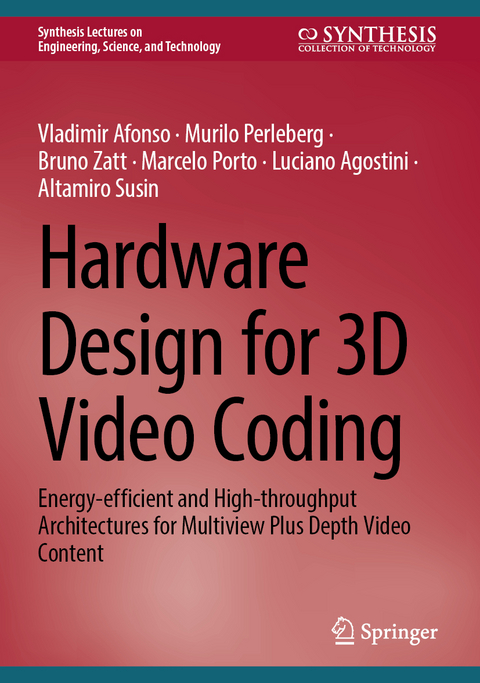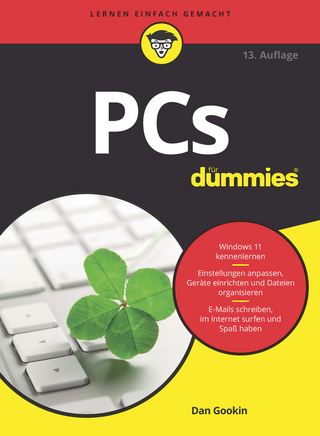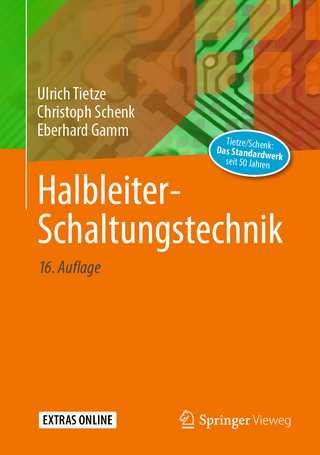
Hardware Design for 3D Video Coding
Springer International Publishing (Verlag)
978-3-031-80231-7 (ISBN)
- Noch nicht erschienen - erscheint am 26.01.2025
- Versandkostenfrei innerhalb Deutschlands
- Auch auf Rechnung
- Verfügbarkeit in der Filiale vor Ort prüfen
- Artikel merken
This book focuses on the research and development challenges posed by 3D video systems based on multi-view plus depth (MVD) technology. This technology can produce a realistic immersive experience generating synthetic video views on the decoder side, reducing the amount of information on the encoder side. The discussion presented in this book explores the MVD characteristics to propose high-throughput and energy-efficient architectures/systems, focusing on 3D-HEVC, the state-of-the-art standard for exploiting the MVD concept. The book includes an extensive discussion of the 3D-HEVC video encoding, followed by an in-depth evaluation of the 3D-HEVC reference software behavior. Then, the book presents in detail a set of high-throughput and energy-efficient architectures targeting the three main prediction steps inside the 3D-HEVC: intra-frame prediction, inter-frame prediction, and inter-view prediction.
Vladimir Afonso received the B.S. degree in industrial automation from the Sul-rio-grandense Federal Institute (IFSul), Pelotas, RS, Brazil, in 2008, the M.S. degree in computer science from the Federal University of Pelotas (UFPel), RS, Brazil, in 2013, and the Ph.D. degree on microelectronics from the Federal University of Rio Grande do Sul (UFRGS), Porto Alegre, RS, Brazil, in 2019. He is a Professor since 2009 at the IFSul and a researcher with the Video Technology Research Group (ViTech) at the UFPel. His research interests include 2D/3D video-coding algorithms, and FPGA-based and VLSI designs for video coding.
Murilo Perleberg received the B.S. degree in computer engineering and the M.S. degree in computer science from the Federal University of Pelotas (UFPel), Brazil, in 2018 and 2020, respectively. He is currently pursuing the Ph.D. degree in computer science at UFPel. He is a member of the Video Technology Research Group, UFPel. His research interests include VLSI design for video coding.
Bruno Zatt received his B.E. and M.S. in Computer Engineering from the Federal University of Rio Grande do Sul (UFRGS), Porto Alegre, Brazil, in 2006 and 2008, respectively. He received his Ph.D. degree in Microelectronics from the PGMICRO (Graduate Program on Microelectronics) at the same university in 2012 with "summa cum laude" distinction. Currently, Bruno Zatt is a Professor at the Federal University of Pelotas (UFPel), Pelotas, Brazil, and a member of the Group of Architectures and Integrated Circuits (GACI) and the Video Technology Research Group (ViTech). He has 19+ years of research experience os digital signal processing including 3 years as an intern researcher at the Karlsruhe Institute of Technology (KIT), Karlsruhe, Germany, 1-year experience as a visiting professor at the University of California, Irvine, USA, and as visiting professor at the Università di Torino, Turin, Italy. He has published over 190+ papers in international journals/conferences and one book entitled "3D Video Coding for Embedded Devices". His expertise includes visual signal processing and coding standards such as 2D video coding (H.264, HEVC, AV1, VVC), multiview video coding (MVC), 3D video coding (3D-HEVC), and Light Fields coding (JPEG Pleno). He holds the status of IEEE Senior Member (since 2016) and CNPq (National Council for Scientific and Technological Development) productivity research fellow (since 2017). He has coordinated several research projects funded by public (FAPERGS, CNPq, CAPES) and private funding agencies (Instituto Serrapilheira). Prof. Zatt also contributes as a member of the Brazilian Committee on Audio, Image, Multimedia and Hypermedia Coding (under ABNT - Brazilian Association of Technical Standards), a member of the Brazilian Microelectronics Society (SBMICRO) council, and a member of IEEE CASS Visual Signal Processing and Communication Technical Committee (VSPC-TC). He served for four years as an adjunct coordinator and two years as coordinator of the Graduate Program in Computing at UFPel. Prof. Zatt also contributes as Coeditor of the Journal of Integrated Circuits and Systems (JICS), Associate Editor for the IEEE Open Journal of Signal Processing (OJ-SP), and Senior Associate Editor for the IEEE Transaction on Circuits and Systems for Video Technology (TCSVT).
Marcelo Schiavon Porto is a Brazilian Distinguished Researcher holding a CNPq PQ-1D grant. He received the M.S. and Ph.D. degrees in computer science from Federal University of Rio Grande do Sul (UFRGS), Brazil, in 2008 and 2012, respectively. He is currently a Professor with the Federal University of Pelotas (UFPel), Brazil, and a member of the Video Technology Research Group (ViTech) and the Group of Architectures and Integrated Circuits (GACI). He is currently a permanent member and advisor of doctor and master's students at the Grad
Chapter 1: Introduction.- 3D-HEVC Overview.- 3D-HEVC Reference Software Evaluations.- Intra-Frame Prediction Architectures.- Inter-Frames and Inter-View Predictions Architectures.- Conclusions.
| Erscheint lt. Verlag | 26.1.2025 |
|---|---|
| Reihe/Serie | Synthesis Lectures on Engineering, Science, and Technology |
| Zusatzinfo | XXV, 230 p. 108 illus., 102 illus. in color. |
| Verlagsort | Cham |
| Sprache | englisch |
| Maße | 168 x 240 mm |
| Themenwelt | Mathematik / Informatik ► Informatik ► Theorie / Studium |
| Informatik ► Weitere Themen ► Hardware | |
| Technik ► Elektrotechnik / Energietechnik | |
| Schlagworte | 3D High Efficiency Video Coding • HEVC • High Efficiency Video Coding • MPEG Immersive Video • Multiview Video plus Depth |
| ISBN-10 | 3-031-80231-4 / 3031802314 |
| ISBN-13 | 978-3-031-80231-7 / 9783031802317 |
| Zustand | Neuware |
| Haben Sie eine Frage zum Produkt? |
aus dem Bereich


